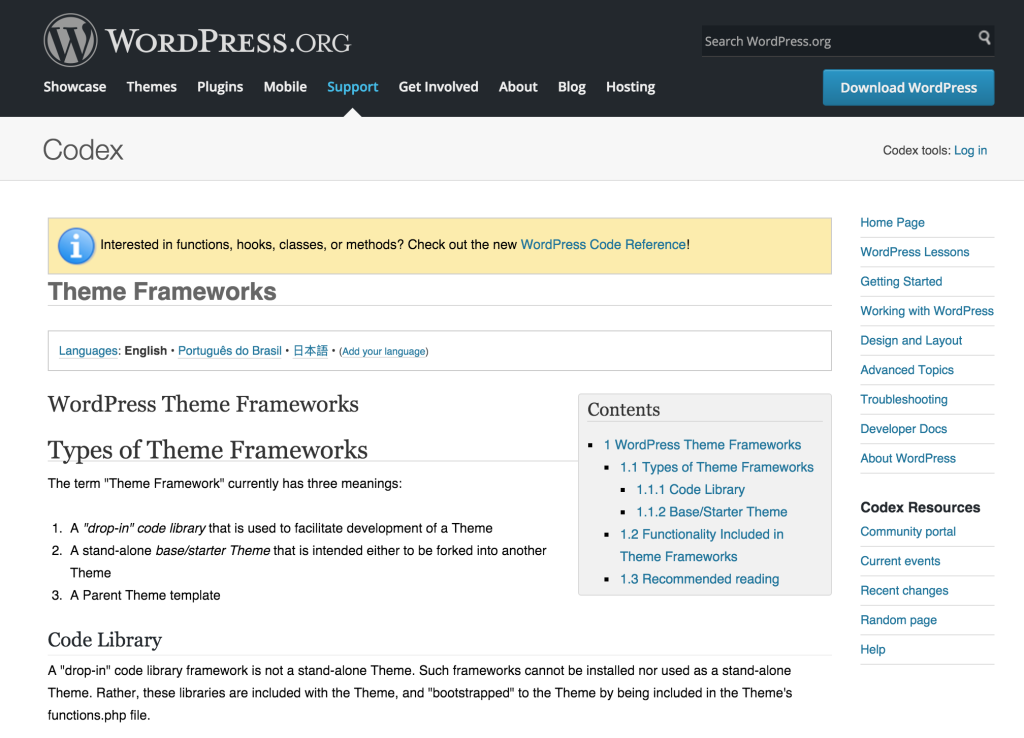- Introduction to WordPress Theme Frameworks
- What Defines a Theme Framework or What Is a WordPress Theme Framework?
- Different Types of Theme Frameworks
- Why Use a Framework?
- Advantages and Disadvantages
- List of WordPress Theme Frameworks
- Tutorials and Articles
- Conclusion
- Frequently Asked Questions about WordPress Theme Frameworks

Introduction to WordPress Theme Frameworks
I was sitting in my office, scratching my head, thinking about WordPress theme frameworks. It is late I’ve been researching for this article for days, weeks, even months and wondering what to write, that is different and unique to the other writing styles about frameworks. Lost in my thoughts I had a brain wave. It occurred to me that when people write about WordPress frameworks they tend to cover only the main ones, you know… the ones that the developers in your local WordPress Meetup community specialise in. frameworks like Genesis, Thesis or WooCommerce. Why is that? Maybe they didn’t look hard enough, or maybe they didn’t want to write about frameworks that might just die off (or are no longer developed). Or maybe they had a tight deadline, and defaulted to the top ranking ones from the search engines. Who knows? I want to be different! Yeah that’s right, sit back grab a coffee. I’m going to take you through a Definitive Guide to WordPress Frameworks. Why definitive? Definitive by definition means “done or reached decisively and with authority. synonyms: conclusive, final, ultimate”. I’m not going to stop at one, two, or even ten frameworks. As I said I’ve been researching this for some time. The list is massive. There are quite a few here that many of you may or may not have heard of. But that’s ok for the purpose sharing and learning from each other. You may find a framework here that you want to contribute too, or suggest one that’s not listed. Are you ready? Here we go!What Defines a Theme Framework or What Is a WordPress Theme Framework?
Before diving into the list, I just need to cover some background into theme frameworks. After all, this may be the first article you’ve ever read about theme frameworks and I don’t want you to be left out. If you’re a veteran of frameworks you can skip down below to the long list of frameworks. A theme framework is essentially a Parent Theme in which a development team or individual developer would create to offer some functionality, that would make it easy to update, and reuse on many sites without effecting the design of individual sites. A Child Theme would then be created to create the custom style sheet, but the functionality would be left up to the main framework. On a side note, this doesn’t mean that every parent theme is in fact a framework. There are template providers out there that provide parent themes with many hundreds of child theme variations, but then don’t use that same code base on their next parent theme (they tell you it’s a framework, when technically it’s not). Over at the WordPress repository they break down three meanings for the term “Theme Frameworks” drop-in, stand-alone, and Parent Theme template, it’s pretty hard to define it any simpler and I suggest you have a read over it sometime. For the purposes of this article I’m going to concentrate more on the last one, Parent Theme Templates. This is the most common form known to the greater development community and the general public.
For the purposes of this article I’m going to concentrate more on the last one, Parent Theme Templates. This is the most common form known to the greater development community and the general public.
Different Types of Theme Frameworks
Frameworks come in many forms, and tackle different aspects of business and design. Some are free and some paid. There are major frameworks which are generic, in the fact that they don’t target any one specific niche but cover broad multifunctional aspects of any industry, helping web designers and developers world wide offer advanced websites with quicker turnaround and build costs, by leveraging these code frameworks. Some of these frameworks have been built over many years with countless thousands of hours of development, to build out extensive, extremely well documented and supported frameworks. Some advanced features of these frameworks are the allowance for frontend drag and drop editors, backend drag and drop, shortcodes, built for many devices and layouts. It’s no wonder why web businesses love using frameworks. My current favourite framework is the SEO Design Framework, built to help rank you better.Why Use a Framework?
It’s a good question, why use a WordPress framework? While you may think that you may never actually need to build your own framework, you may have already used a framework without really realizing it. Frameworks like Genesis and WooFramework, Thesis, are now so common that you could almost be forgiven (or at least forgive a newbie) that it was part of WordPress core. Let’s take this example. Noel Tock built websites for the hospitality industry niche. Building his own framework was a benefit to him, so he could deliver great projects to his customers and continually add value and optimize it for performance, without the bloat of other functions that his customers will never need. This helped him to speed up development, and offer a more long lasting solution to his clients. Added benefits can go as far as saving his team support and training time for new staff and clients. There are many benefits that he had to consider like SEO and development best practice. But he had the benefit that he didn’t have to go and get a bunch of plugins to add much needed items like rich snippets, social comments, and mobile first design. As well as build email lead generation forms and so on. He gave the clients flexibility of a semi custom design, and could easily create new designs just by editing a newstyle.css and functions.php file.
For him this has evolved into a SaaS solution, and his framework turned into the service Happy Tables.
Have I got you thinking? What’s your niche? And how about a framework for your vertical?
Advantages and Disadvantages
There are many advantages to using a WordPress theme framework. From many of the popular ones, you don’t have to go far to see a hive of activity of developers, and designers, in forums, and communities helping the bamboozled. The strength of the code, is generally of higher calibre, meeting WordPress coding standards, and can easily be put through its passes, with testing plugins and services, like WP Test , Theme Authenticity Checker (TAC) and Theme Check. Some key points that are an advantage would be;- easier development long term
- built-in functionality (less dependency on plugins)
- code quality
- upgrades
- learning curve
- hooks and filters capabilities
- code bloat
- limitations (if it’s not your own)
- cost
- updates and support
List of WordPress Theme Frameworks
In no particular order:- Ultimatum
- Mysitemyway
- iThemes Builder
- Genesis
- Thesis
- Devine-elemente
- Presswork
- Headway
- WooFramework
- Roots
- Beans
- X
- ThemeFusion
- Odin
- Gantry
- Themeblvd
- WordPress Jump Start
- SEO Design Framework
- Kaytwo or K2
- Cherry Framework
- RtPanel
- Hybrid Core
- Thematic
- Runway
- WonderFlux
- Unyson
- FoundationPress
- Warp Framework
- Sparky
- Reactor
- Volatyl
- Omega
- StartBox
- Maera
- Xtreme One
- Redux
- WP Casa
- Startup
- Whiteboard
- YA Framework
- Options Framework Theme
- UpThemes Framework
- Reverie
- Vafpress
- Titan
- Backbone
- Skematik
- Nouveau
- Fluent
- Carrington Build
- Theme 500
- TemplateToaster
- Pro Framework
- Simon WP Framework
- Seed Theme
- Tesla Framework
Tutorials and Articles
As mentioned in the opening of this article, SitePoint has a growing list of resources covering a variety of WordPress theme frameworks, here are a few of our most popular to get you started:- 4 of the Most Popular WordPress Theme Frameworks
- An Introduction to the Genesis Framework
- Introducing Beans: A Streamlined WordPress Framework
- Reverie: A Foundation Based WordPress Starter Theme
Conclusion
To gather this long list, I reached out to several WordPress communities for guidance, and an opportunity to share the not so common, and if you are serious about WordPress and want in, I suggest you join too. Thanks goes out to the LinkedIn Community for their input into many of the frameworks above. It’s almost impossible to cover every framework, new ones appear quite frequently. If you find a framework not listed above, and it is based on the definitions of a framework, a real framework, not a one-size fits-all theme, then by all means, please list it in the comments below.Frequently Asked Questions about WordPress Theme Frameworks
What are the key features to look for in a WordPress theme framework?
When choosing a WordPress theme framework, there are several key features to consider. Firstly, the framework should be highly customizable, allowing you to modify the design and layout to suit your specific needs. It should also be SEO-friendly to help improve your website’s visibility on search engines. Other important features include responsive design, compatibility with popular plugins, and regular updates for security and functionality improvements. Some frameworks also offer additional features like drag-and-drop builders, pre-designed templates, and dedicated support.
Are WordPress theme frameworks suitable for beginners?
Yes, WordPress theme frameworks can be suitable for beginners, but it largely depends on the specific framework. Some frameworks are designed with beginners in mind, offering user-friendly interfaces, extensive documentation, and community support. However, others may require a certain level of coding knowledge. It’s important to research and choose a framework that matches your skill level and comfort with coding.
How do WordPress theme frameworks affect website performance?
A well-designed WordPress theme framework can significantly improve your website’s performance. It can make your site load faster, which is crucial for user experience and SEO. However, not all frameworks are created equal. Some may be bloated with unnecessary features that can slow down your site. Therefore, it’s important to choose a lightweight, optimized framework.
Can I switch between different WordPress theme frameworks?
Yes, you can switch between different WordPress theme frameworks. However, it’s important to note that switching frameworks can affect your website’s design and functionality. Before making a switch, it’s recommended to backup your website and test the new framework on a staging site.
Are there free WordPress theme frameworks available?
Yes, there are several free WordPress theme frameworks available. These can be a good option for those on a tight budget or those who want to experiment with using a framework. However, free frameworks may lack some features and support compared to premium options.
How do WordPress theme frameworks affect SEO?
WordPress theme frameworks can significantly impact your website’s SEO. A good framework will be coded with SEO best practices in mind, helping your site to rank higher in search engine results. Some frameworks also include built-in SEO tools and options.
Can I use a WordPress theme framework for an e-commerce site?
Yes, many WordPress theme frameworks are fully compatible with popular e-commerce plugins like WooCommerce. They offer special features and templates designed for online stores, making it easier to set up and manage your e-commerce site.
What is a child theme in WordPress theme frameworks?
A child theme in WordPress is a sub-theme that inherits all the functionality, features, and style of its parent theme, which is the framework. Child themes are used to customize the parent theme without affecting the original code, making it easier to update the framework without losing your customizations.
How often are WordPress theme frameworks updated?
The frequency of updates can vary between different WordPress theme frameworks. However, reputable framework developers typically release regular updates to fix bugs, add new features, and ensure compatibility with the latest version of WordPress.
Do WordPress theme frameworks offer support?
Most premium WordPress theme frameworks offer dedicated support to their users. This can include access to a support forum, email support, or live chat. Free frameworks, on the other hand, may offer limited or community-based support.
 Chris La Nauze
Chris La NauzeChris runs Lanauze Designs, a small virtual agency in the Northern Suburbs of Melbourne, Australia. He predominantly works with clients in the Restaurant and Hospitality Industries, of which he has had extensive experience in (an Ex Chef, and Industrial Designer). Chris brings a unique edge to his clients, combining inside Hospitality industry knowledge, Design, Graphics, Photography, SEO, Email Marketing, Marketing, advanced funnel techniques and anything in between. Chris is an active member of the WordPress community in Melbourne and online.

